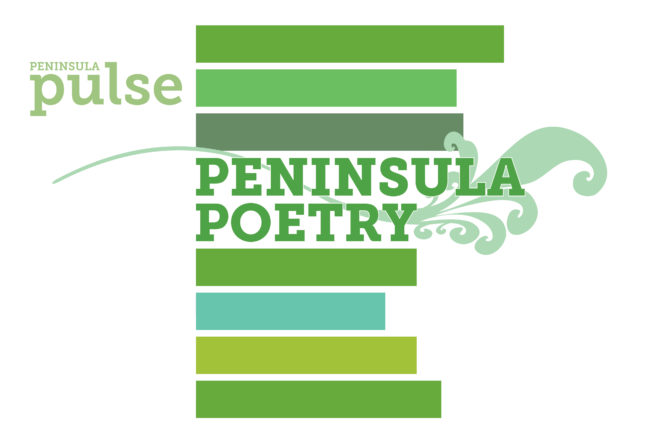Peninsula Poetry: David Clowers
- Share
- Tweet
- Pin
- Share

After his family camped in Peninsula State Park during the 1950s, David Clowers bought 30 acres of Door County woods in 1976, then moved into a small, self-built cabin in 2001.
He earned a B.A. in English language, history and literature from Kalamazoo College and received the Rackham Fellowship for an M.A. from the University of Michigan before teaching English for three years at Drake University. He also attended law school at the University of Chicago, then practiced law for 50 years in Milwaukee and Sturgeon Bay.

Clowers continued his interest in teaching by facilitating groups at Columbia–St. Mary’s Hospital in Milwaukee and teaching poetry and theater for Door County Learning in Retirement. He has also performed locally with Isadoora and Rogue Theater and serves on the boards of Door Shakespeare and Rogue Theater.
Clowers’ poems have appeared in numerous publications, received honorable mentions in several Wisconsin Fellowship of Poets contests and earned a half dozen honorable mentions in past Hal Prize contests, with his poem “Delicious” taking second place. He has also self-published two chapbooks, Shedding My Three-Piece Birthday Suit and Doggysattva Love.
What is your writing routine?
I begin the process of writing as soon as I open my eyes in the morning. Ideas for new poems, or for new ways of expressing something I’ve already written, often arrive with first light, but the mechanical part of writing, which is using my laptop, begins after breakfast. Although I can begin a poem at any time, or even on the back of an envelope or the margins of a newspaper – whatever is handy – using a laptop to do the actual work of assembling a finished poem is essential for me because I continually make changes and move text around.
If I’m working on something for a contest, I’ll work on that poem, or poems, for an hour or more, interspersing short breaks to read the news in between actual efforts to revise my work. These breaks give me a little critical distance so that I have fresh eyes to return to the text. If I don’t have a deadline, I review lists of older poems to see if there is something I’d like to revisit or revise.
What do most poorly written poems have in common?
To my way of thinking, telling rather than showing the reader what the poem is about is the most common flaw of bad poetry, but a close second is to pick a subject to which the reader will have trouble relating. Unless you can figure out how to make your personal experiences relatable to your reader, it’s probably best not to tell us about the leftover chicken you had for lunch or your infected big toe.
What do most well-written poems have in common?
The most important thing for me would be the element of surprise: The poet has found a way to say something different about her subject, to say something in a different way and to offer the reader a new way of understanding his subject.
Is it important to understand the meaning of the poem or for the reader to be able to “solve” it?
I’ll preface what I’m about to say on that question by first identifying two different styles of poetic expression, identifying the intended audience for the poem and then stating my personal bias about what a poet should try to do.
First, poetry arrives as an oral tradition. The first epics were spoken or sung, and their sound and rhythmic effects were essential mnemonic devices. Today, hip-hop and rap poetry and music carry on this ancient tradition.
Opposed to that sort of “performance poetry” is what I call “page poetry,” and it is a more recent development – one in which the poet uses spacing and/or dense linguistic juxtapositions to convey his or her subject.
When you begin to write, you pick your audience. If your intended audience is someone who does the NYT Sunday crossword puzzle, make [the reader] work, and maybe send your stuff in to the New Yorker or to a university-published quarterly.
If you want to communicate with the average reader of poetry, however, then stick to relatable topics stated in relatable ways. Mary Oliver and Ted Kooser come to mind as good examples of this sort of poetry.
What book are you reading right now?
God’s Hotel by Victoria Sweet: a critical look at the American health care system from the perspective of a medical doctor who studied, and now tries to apply, the insights of Hildegard of Bingen, a medieval healer who was also a musician, mystic and nun.
Peninsula Poetry is a monthly column curated by the Door County Poets Collective, a 12-member working group that was formed to publish Soundings: Door County in Poetry in 2015 and continues to meet.
Breakfast at Kimz Café in March Just this much is all I get this morning: one-half Kimz Skillet Special, a day cold enough to be January and a pale sun that’s shining on the other side of the street. But while I’m sitting alone in Kimz Café, my waitress – who has blue stars tattooed all over the bare skin of her chest – asks me if there is anything more I want.
Immigrant Poetry Poems are not places: they’re travelers to new destinations, diasporas of words seeking new comprehension. Like Coffin Ship Irish who were starved to their bones, poems arrive hungry for your fresh perception, but then like Norse farmers who went Viking in season, poems ravish your senses past prosaic reason of how you will feel when you welcome them home.
When the Judge Said When the judge said, Will the defendant please rise? in court this morning, for some reason I thought of bread. But in criminal court there are no sweet rolls, only gritty dough ready for baking inside prisons like Redgranite or Waupun where gray stone, steel bars, and iron gates make strange stoves that when their doors clang shut, you understand why they call these ovens Slammers. They bake unevenly, leave hard crusts on tough, coarse loaves, and when they’re sent back, still hot, to the city, they will probably become, for everyone concerned, very hard to digest.
Critique of Pure Reason An intellectual is a person who has discovered something more interesting than sex. Aldous Huxley While my hands are fidgeting on your back I think about Jung saying that if you showed him a sane man he would cure him for you, which makes me wonder if anyone who is sane can ever love, because love means losing yourself in your lover. Le petit mort, the French call it, but then they always seem to have love on the table with red wine and a crisp baguette, and Brecht might have been talking about love, as well, I suppose, when he said, First, feed the face, and then talk right and wrong. But I think I’ve lost my place, my love. Please take me around that curve on your body that makes me stop thinking about everything, and puts me in touch with my hands.
Delicious Since God expelled his first two students for learning, should we assume ignorance is the only way to understand creation? I’d still want to know what rain wants when it falls. What that dead fox, lying by the side of the road, wanted from the other side, and why passion cooled into the glacier that flowed across the face of my wife. So now, Eve, please tell me. How does this apple taste to you?
The Speed Limit of the Universe The speed limit of the universe is supposed to be the speed of light. And I guess it is if you want to know how fast a photon can travel. But what about information in the universe? How fast does that go? Let me tell you a story. My love was in London and I called to say I was on my way but wished I was already there, not half a continent and an ocean away. You are here, she began, as I felt something slide down across my shirt right over my heart. I even looked to see. That’s when she said, I’m in your pocket, Luv!
